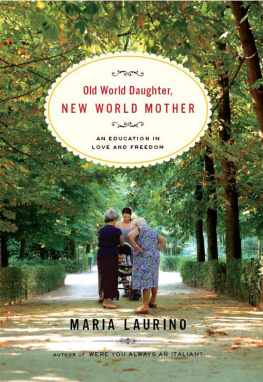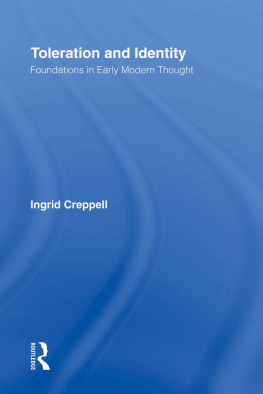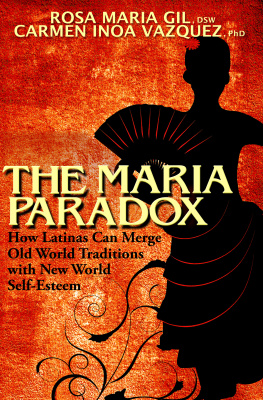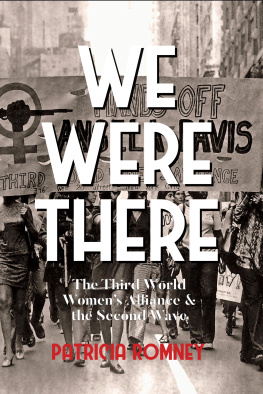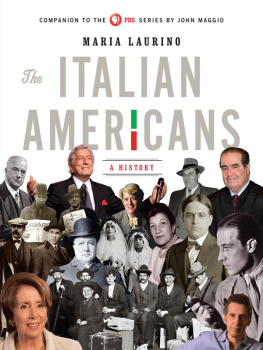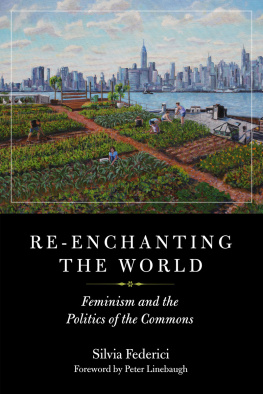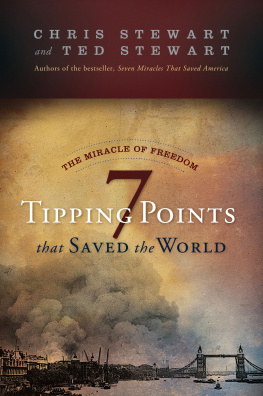Old World Daughter,
N EW W ORLD M OTHER
AN EDUCATION IN LOVE & FREEDOM
Maria Laurino

W. W. N ORTON & C OMPANY
New York London
Copyright 2009 by Maria Laurino
Next Day from The Complete Poems by Randall Jarrell, first edition, 1969.
Reprinted by permissions of Farrar, Straus and Giroux.
Lyrics to Arthur Theme used by permission courtesy of the music publishers ole and Cookie Jar Music Inc.
Excerpt from East Coker in Four Quartets , copyright 1940 by T. S. Eliot and renewed by Esme Valerie Eliot, reprinted by permission of Harcourt, Inc.
La Vie Boheme by Jonathan Larson 1996 Finster & Lucy Music Ltd. Co. All
Rights Administered by Universal Music Corp. (ASCAP)
Used by Permission. All Rights Reserved.
All rights reserved
For information about permission to reproduce selections from this book,
write to Permissions, W. W. Norton & Company, Inc.,
500 Fifth Avenue, New York, NY 10110
Library of Congress Cataloging-in-Publication Data
Laurino, Maria.
Old World daughter, New World mother: an education in love & freedom / Maria Laurino.
p. cm.
ISBN: 978-0-393-07149-8
1. Laurino, Maria. 2. Laurino, MariaFamily. 3. Italian AmericansBiography. 4. Italian American womenBiography. 5. Mothers and daughtersUnited StatesCase studies. 6. Children of immigrantsUnited StatesCase studies. 7. Intergenerational relationsUnited StatesCase studies. 8. Italian AmericansEthnic identityCase studies. 9. FeminismUnited StatesCase studies. I. Title.
E184.I8L37 2009
306.874'3dc22
2008035135
W. W. Norton & Company, Inc.
500 Fifth Avenue, New York, N.Y. 10110
www.wwnorton.com
W. W. Norton & Company Ltd.
Castle House, 75/76 Wells Street, London W1T 3QT
F OR T ONY AND M ICHAEL
A ND, WHAT WAS EVEN MORE EXCITING, she felt, too, as she saw Mr. Ramsay bearing down and retreating, and Mrs. Ramsay sitting with James in the window and the cloud moving and the tree bending, how life, from being made up of little separate incidents which one lived one by one, became curled and whole like a wave which bore one up with it and threw one down with it, there, with a dash on the beach.
V IRGINIA W OOLF
M EMORY TRULY COUNTS for an individual, a society, a cultureonly if it holds together the imprint of the past and the plan for the future, if it allows oneto become without ceasing to be, to be without ceasing to become.
I TALO C ALVINO
Glassed In
A FEW SUMMERS AGO I found myself alone in a glass shop in Venice surrounded by thousands of dollars worth of unenclosed handblown jewelry. The owner had left me there, trusting my honesty.
He was a sweet-faced man whose life seemed bathed in the heat of softened canes of glass and just-made espresso. I admired the voluptuously colored pendants that he created in his small shop, sweltering from the August air and the steady gas flame, as he practiced a family trade that dated back to Murano glassmaking in the fourteenth century. He spoke English well, so we began a conversation. I learned that he was married to an American woman and they had a baby. Discussing life in Italy, I told him that my grandparents were born in the south of the country.
Oh, they are much more traditional in the south than we are here in the north, he replied. Family, for instance, is still very important to them.
As I fingered the pendants and bracelets before me, the phone rang and the glassmaker spoke rapidly and animatedly in Italian.
Mamma, vuoi un caf? I overheard him say. Then he darted out with a small cup in his hand, looking back over his shoulder to ask if I could wait a few minutes.
Im sorry, he apologized upon his return. I had to bring a coffee to my mamma.
Basement Memories
H OW A YOUNG M ARIA LEARNS OF THE O LD W ORLD
WAYS OF HER GRANDPARENTS
I AM A DESCENDANT of people who believed in the primacy of family, who understood that the greatest moral, spiritual, and emotional satisfaction is derived from caring for others, especially the young and the old. They also believed in the evil eye and kept women out of the basement for fear that their menstrual cycle would spoil the fermenting wine. Most rational granddaughters would run for the hills (or from the suburbs) to escape this peasant past, and for many years I did just that.
The idea that my maternal and paternal grandfathers, both of whom died before I was born, pressed grapes in their New Jersey basement or backyard only confirmed my belief that I was some kind of Italian-American Beverly Hillbilly, plunked down in the middle-class section of the affluent suburb Short Hills. Back in the Seventies (to add to the layers of my ethnic shame), Italian-American culture was defined by Francis Ford Coppolas The Godfather , not Francis roaming his extensive Napa vineyards and bottling his own brand of wine.
But as my mother liked to tell me, three decades earlier my grandfather Natale would bring home heavy wooden crates, shipped in refrigerated freight cars from the rolling hills of California to the train yards of Newark, New Jersey, filled with boxes upon boxes of rich purple grapes. Every October marked Natales annual pilgrimage to the bustling Avenue C rail yards, where he would stand among crowds of Italian men tasting dozens of bunches of grapes. He would purchase about seventy crates containing hundreds of pounds of grapes to produce three or four barrels of wine, enough to last him until the next fall. My grandfather kept the grapes in his basement, along with a wine press, the oak barrels, and a trough that held several five-gallon glass jugs of his finished product sealed with a thick cork.
Like many southern Italian immigrants, my grandfather came to America at the turn of the twentieth century; he started his own construction company in 1906. He laid down the red bricks for a three-story apartment building at 1977 Springfield Avenue in Maplewood, making a home for his family along a busy road that led to the city of Newark. Although New Jersey didnt have the right climate for harvesting grapes, like the vineyards he had known in Conza della Campania, the small village in the province of Avellino where he was born, my grandfather found relief from the hot pavement by planting a flower and vegetable garden in a large lot he owned adjacent to his apartment building.
Natale, despite earning his bread through hard physical labor, needed roses, too, and he searched for a glimpse of beauty and a space for leisure in his life. He grew himself a fig tree and dug it up every winter, blanketing its roots like a baby until the chilled earth warmed at planting time. In summer, hed pluck a leaf from one of his basil plants, roll the earthy, mint-scented herb tight, and tuck it behind his ear. A rose-covered trellis decorated the center of the garden, and water lilies floated in a goldfish pond. Colorful patches of pansies, poppies, peonies, and mountain pinks caught the interest of passersby. Although my grandfather never intended to part with his favorite flowers, he liked to please those who requested bouquets, so he put together bunches to sell for a quarter.
Early each morning my grandmother, Maria Cantarella Conti, entered the garden that her husband tenderly cultivated. Straddling the zucchini, squash, peppers, and dandelions, she would slowly squat her heavy body to the earth, pick the days selection, and place it in her large apron pockets. Weighed down with these vegetables, my grandmother would waddle to the tomato vines to pluck a handful, then climb three flights to the kitchen to begin her morning cooking. Peering out the window, shed usually catch a neighbor sneaking into my grandfathers garden to dig up dandelions for her familys dinner salad, but she kept the womans offense to herself.

